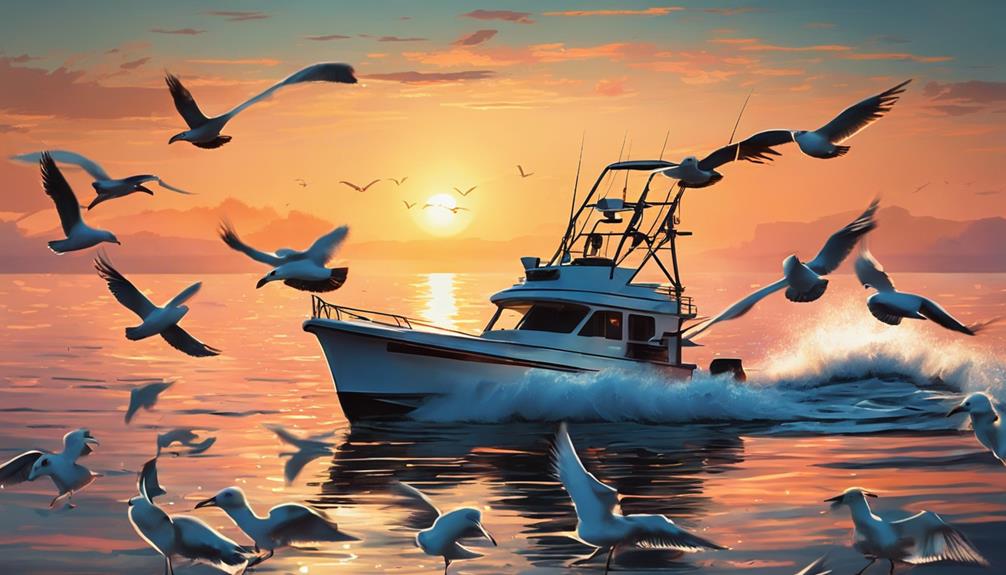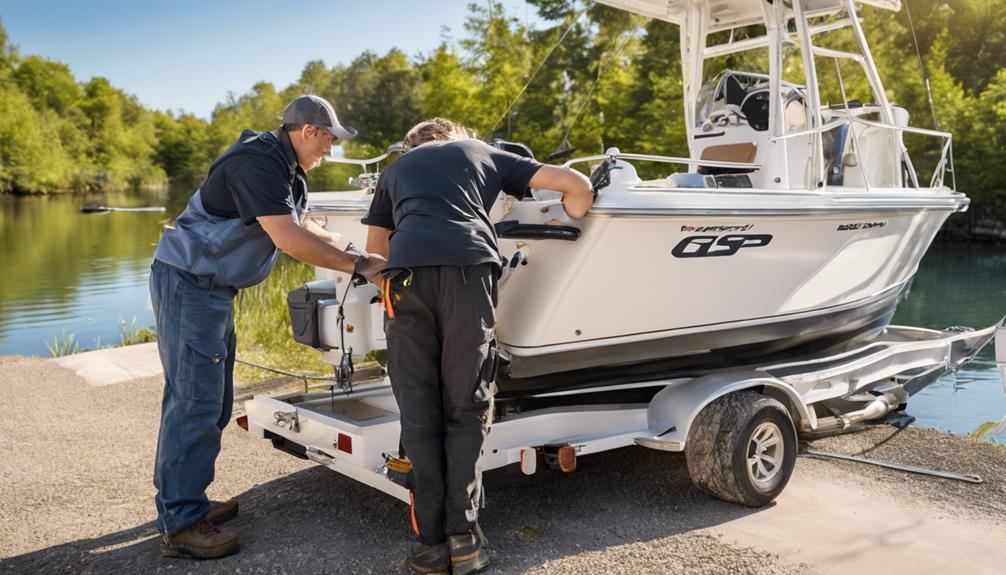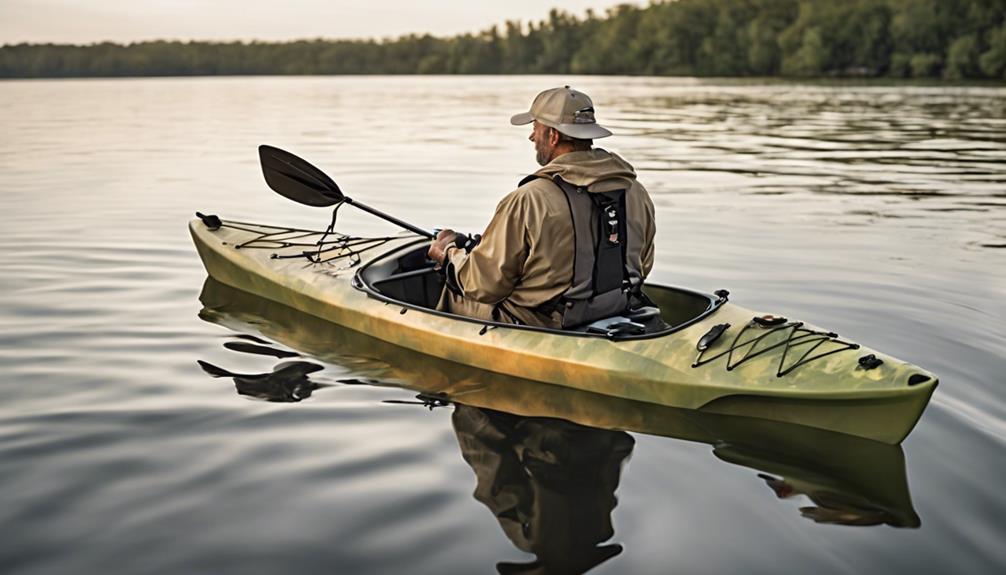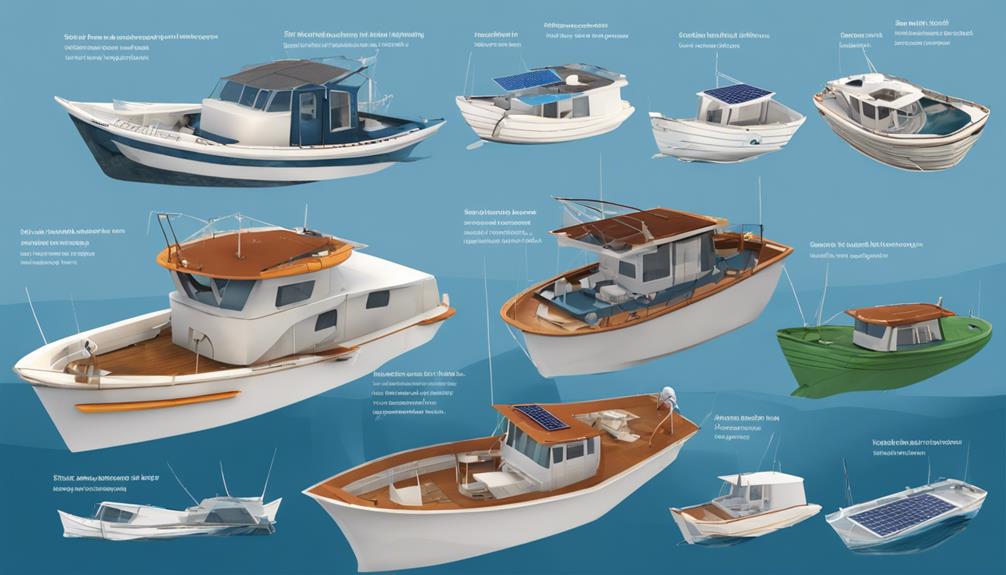If you've ever dreamed of reeling in a trophy marlin miles away from the shore, then opting for offshore fishing boats might be the next logical step for you. Picture yourself navigating the open waters, the thrill of the catch, the vast expanse of the ocean around you.
But why should you choose an offshore fishing boat over other options? The answer lies in the unique capabilities and advantages these vessels offer, making them a must-have for serious anglers seeking new challenges and bigger catches.
Key Benefits of Offshore Fishing Boats
When considering offshore fishing boats, you'll find that their key benefits include superior durability and long-range capabilities. These vessels are designed to withstand the harsh conditions of the open sea, making them ideal for extended fishing trips far from shore. One of the most important advantages of offshore fishing boats is their fuel efficiency. With advanced engine technologies and streamlined hull designs, these boats can cover long distances without consuming excessive amounts of fuel. This not only saves you money on fuel costs but also allows you to stay out on the water for longer periods, increasing your chances of a successful fishing expedition.
In addition to fuel efficiency, offshore fishing boats are known for their exceptional weather resistance. Whether you encounter rough seas, high winds, or heavy rain, these boats are built to handle whatever Mother Nature throws their way. The sturdy construction and robust materials used in their manufacturing ensure that you stay safe and comfortable even in challenging weather conditions. This weather resistance also means that offshore fishing boats require less maintenance and upkeep, as they're less prone to damage from the elements.
Factors to Consider When Buying
Considering several factors before purchasing an offshore fishing boat can help you make an informed decision and ensure that the vessel meets your specific needs and preferences. When looking to buy an offshore fishing boat, two crucial aspects to evaluate are pricing comparison and brand reputation. Conducting a thorough pricing comparison among different manufacturers and models will help you find the best value for your budget. Additionally, considering brand reputation is essential as it reflects the quality and reliability of the boat.
Another vital factor to consider is the hull design. The hull plays a significant role in the boat's performance and stability in offshore waters. Different hull designs offer varying levels of comfort and seaworthiness, so it's important to choose one that suits your fishing style and preferences. Moreover, evaluating the engine power of the boat is crucial. The engine power determines the boat's speed, fuel efficiency, and its ability to handle different sea conditions. Selecting the right engine power based on your intended use and the size of the boat is key to enjoying a seamless fishing experience offshore.
Top Features to Look For
To ensure you select the best offshore fishing boat for your needs, prioritize features that enhance performance and durability. When it comes to boat design, look for models with deep-V hulls that provide stability in rough waters and a smoother ride. A deep-V hull is essential for offshore fishing as it helps the boat cut through waves efficiently, making your fishing experience more comfortable and safer.
Additionally, consider boats with a center console layout, as this design offers ample space for moving around while fishing and provides easy access to all sides of the boat, making it convenient to handle your gear and catch. Look for features like built-in rod holders, baitwells, and storage compartments to keep your equipment organized and readily accessible during your fishing trips.
In terms of fishing accessories, prioritize boats equipped with advanced fish-finding technology such as GPS, sonar, and radar systems. These tools can significantly improve your chances of a successful fishing outing by helping you locate schools of fish and navigate to productive fishing spots with ease. Furthermore, consider boats that come with a sturdy T-top or hardtop for shade and protection from the elements, ensuring a more comfortable and enjoyable fishing experience.
Maintenance Tips for Offshore Boats
Ensure your offshore fishing boat stays in top condition by implementing these essential maintenance tips.
When it comes to hull care, regularly inspecting the hull for any signs of damage is crucial. Look out for cracks, blisters, or any other abnormalities that could potentially worsen over time. Promptly address any issues to prevent further damage and maintain the integrity of your boat's hull. Additionally, applying a fresh coat of anti-fouling paint can help protect the hull from marine growth and corrosion, extending its lifespan.
Engine maintenance is another key aspect of keeping your offshore boat in optimal shape. Remember to follow the manufacturer's guidelines for routine engine maintenance tasks such as oil changes, filter replacements, and spark plug inspections. Properly maintaining your engine not only ensures reliable performance but also helps prevent costly repairs down the line. Regularly checking the fuel system for any leaks or clogs is also essential to avoid any issues while out at sea.
Choosing the Right Size Boat
When selecting a boat for offshore fishing, it's essential to carefully consider the right size to meet your needs and preferences. Boat size plays a crucial role in your offshore fishing experience.
The size of the boat determines the number of passengers it can carry comfortably, the storage options available, and how it handles different sea conditions. A larger boat provides more space for movement, equipment, and amenities, making long fishing trips more comfortable. However, larger boats can be more challenging to maneuver and require more maintenance. On the other hand, smaller boats are easier to handle but may lack the storage capacity and stability needed for offshore fishing.
Consider the storage options when choosing the right size boat. Adequate storage is essential for keeping your fishing gear, safety equipment, food, and other supplies organized and easily accessible. Larger boats typically offer more storage compartments and space for coolers, baitwells, and fish lockers. Smaller boats may have limited storage, requiring you to pack strategically for your fishing trip.
Best Materials for Offshore Boats
Consider the durability and performance of fiberglass, aluminum, and composite materials when selecting the best materials for offshore fishing boats. Each material has its strengths and weaknesses, so it's essential to choose wisely based on your specific needs:
- Fiberglass:
- *Advantages*: Fiberglass is a popular choice for offshore boats due to its durability, resistance to corrosion, and ease of maintenance.
- *Disadvantages*: However, fiberglass can be heavier than other materials, affecting the boat's speed and fuel efficiency.
- Aluminum:
- *Advantages*: Aluminum boats are lightweight yet sturdy, making them fuel-efficient and easier to transport.
- *Disadvantages*: While aluminum is resistant to corrosion, it's more prone to dents and can be noisier on the water.
- Composite Materials:
- *Advantages*: Composite materials, such as carbon fiber, offer a great strength-to-weight ratio, enhancing the boat's performance.
- *Disadvantages*: The high cost of carbon fiber options may deter some buyers, but the benefits in terms of speed and durability can outweigh the initial investment.
When deciding between aluminum vs. fiberglass or considering carbon fiber options, think about your priorities regarding weight, durability, maintenance, and budget to select the best material for your offshore fishing boat.
Understanding Boat Stability
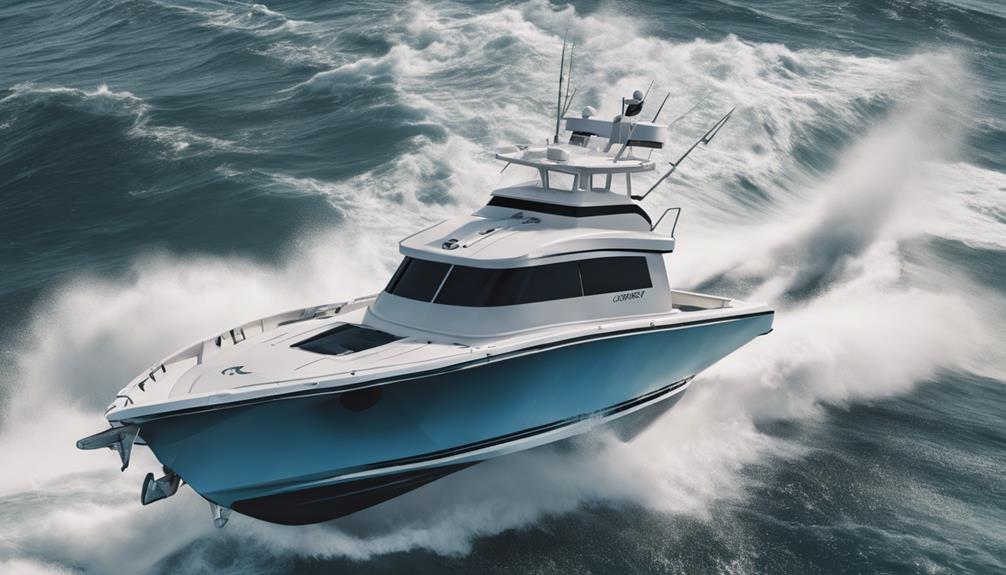
For a safe and enjoyable offshore fishing experience, grasp the concept of boat stability. Boat stability is crucial for ensuring your safety and comfort while out on the water. Understanding the stability factors and knowing how to maintain it properly will enhance your overall fishing experience.
When it comes to boat stability, factors such as the design of the boat play a significant role. A well-designed boat will have a lower center of gravity, making it less likely to tip over in rough waters. Additionally, safety features like anti-roll bars and stabilizers can further improve the stability of the vessel, providing you with a smoother ride.
To maintain optimal stability, regular maintenance is key. Make sure to check for any signs of wear and tear on the hull, as this can impact the boat's stability. Keep the ballast tanks properly filled and distribute weight evenly to prevent the boat from leaning to one side.
Safety Equipment Essentials
Ensure you have the necessary safety equipment onboard to enhance your offshore fishing experience. When venturing into the open waters, having the right safety gear and knowing the regulations can make a significant difference in ensuring a safe and enjoyable fishing trip.
Here are four essential safety equipment items and practices to consider:
- Personal Flotation Devices (PFDs): Always have an adequate number of Coast Guard-approved PFDs onboard for each passenger. Make sure they're easily accessible in case of an emergency.
- First Aid Kit: A well-stocked first aid kit is crucial for attending to any injuries or medical emergencies that may occur while offshore. Check the kit regularly to ensure all supplies are up to date.
- Emergency Signaling Devices: Carry devices such as flares, whistles, and a signaling mirror to attract attention in case of emergencies. Familiarize yourself with how to use these items effectively.
- Navigation Tools: In addition to electronic navigation equipment, it's wise to have backup tools like compasses and nautical charts in case of technology failure. Knowing how to navigate using these tools can be a lifesaver.
Frequently Asked Questions
Can Offshore Fishing Boats Be Used for Other Activities Besides Fishing?
Offshore fishing boats can indeed be used for more than just fishing. They're versatile vessels perfect for various activities. From water sports like diving or snorkeling to leisurely cruising along the coastline, these boats offer endless possibilities.
You can also use them for adventure tours to explore remote locations or for wildlife watching excursions. Their durability and spacious design make them ideal for all sorts of marine adventures.
How Often Should Offshore Fishing Boats Be Serviced and Maintained?
To keep your offshore fishing boat in top shape, follow a maintenance schedule. Regular servicing is crucial. It's recommended to service your boat at least once a year, but more frequent checks are ideal for heavy usage.
Preventative measures can save you from costly repairs. Be proactive with maintenance to avoid unexpected breakdowns and high repair costs.
Stay on top of servicing to enjoy smooth sailing and worry-free fishing trips.
Are There Any Specific Regulations or Licenses Required for Operating Offshore Fishing Boats?
When operating offshore fishing boats, it's crucial to understand the regulations, licenses, safety measures, and training required.
Regulations ensure compliance with laws, licenses validate your qualifications, safety protocols protect you and others, and training equips you with necessary skills.
Prioritize these aspects to navigate the waters responsibly and enjoy a successful fishing experience.
How Can I Ensure My Offshore Fishing Boat Is Properly Equipped for Long Offshore Trips?
To ensure your offshore fishing boat is ready for long trips, focus on safety equipment like life jackets and first aid kits. Additionally, invest in navigation tools such as GPS systems and marine radios for communication.
Prioritize having proper lighting and signaling devices onboard. Regularly check and maintain all equipment for optimal performance. Safety and preparedness are key for successful offshore fishing adventures.
What Are Some Common Challenges or Risks Associated With Offshore Fishing That Boat Owners Should Be Aware Of?
When heading offshore for fishing, be aware of common challenges like unpredictable weather conditions. Ensure safety by following proper measures onboard.
Develop strong navigation skills and have emergency protocols in place for any unforeseen situations.
Being prepared for these risks will help you navigate the waters with confidence and enjoy a successful fishing trip.
Conclusion
So, if you're looking for a reliable and sturdy fishing boat for offshore adventures, opting for an offshore fishing boat is the way to go.
With key benefits like durability, stability, and versatility, along with essential safety features and maintenance tips, you can enjoy a successful and safe fishing experience on the open waters.
Make sure to consider the factors, features, and size that best suit your needs before making your purchase.
Happy fishing!
